Stakeholders, including health policy makers and advocates have said bridging the gaps in access to Family Planning services will help Nigeria achieve phenomenal improvements in health outcomes and attain unprecented economic growths within a comparatively short period of time.
Speaking at various occasions to mark the 2025 International Women’s Day (IWD), the stakeholders made copious allusions to the 2024 assertion by the World Economic Forum (WEF, 2024) that achieving full gender parity at current pace could take until 2158, approximately five generations from now.
Speaking from their respective locations across the country, the stakeholders are optimistic that accelerating access to reproductive health and Family Planning services can dramatically shorten this timeline, empowering women and girls at the same speed to make informed decisions about their health, careers, and families.
A 2023 research from the Guttmacher Institute had highlighted that access to contraceptive services reduces unintended pregnancies, improves maternal health, and enhances educational and economic opportunities for women. This affirms a World Health Organisation (WHO) report in the same year which gave credence to studies which have shown that access to Family Planning can lower maternal deaths by 30% and reduce infant mortality rates by 10-15% (WHO, 2023).
Similarly, the United Nations Population Fund (UNFPA) had ascertained in a 2023 report that access to Family Planning can increased female workforce participation, stating also that when women have control over their reproductive choices, they are more likely to complete their education and join the labor market, contributing to economic growth.
Although Family planning remains a cornerstone of public health and socio-economic development, a 2023 study by Nigeria Demographic and Health Survey (NDHS) revealed that modern contraceptive prevalence in Nigeria stands at 12%, a figure significantly lower than that of other African countries such as Kenya (24%) and Ghana (20%).
This, according to experts, underscores the urgent need to scale up Family Planning interventions to meet the reproductive health needs of women and families across the country. This call comes in the face of the fact that disparities in access to Family Planning persist across various states in the country, with rural areas and conflict-affected regions facing the greatest challenges.
Although states like Lagos and Kwara have recorded notable progress due to strategic interventions and increased investments in reproductive health programmes by organisations like The Challenge Initiative (TCI), the contrast is being recorded in some states in northern Nigeria like Yobe and Jigawa, where cultural barriers and misconceptions continue to hinder contraceptive uptake.
Across Lagos, Adamawa, Borno, Sokoto, Jigawa, Yobe, Osun, Kwara, Lagos, Akwa Ibom, and Edo States, TCI is leading efforts to ensure that FP services are accessible, affordable, and sustainable. These are championed by The Challenge Initiative (TCI) with the state government at the driver’s seat for implementation.
According to the Permanent Secretary, Lagos State Ministry of Health, Dr. Olusegun Ogboye, the state’s partnership with TCI has helped bridged access to Family Planning services for many who were previously excluded.
“Our partnership with TCI has transformed FP services, ensuring wider access and uptake of contraceptives,” Dr Ogboye stated.
In Adamawa State, the story is not different as the state’s Commissioner for Health, Dr. Fatima Atiku Abubakar, said, “Investing in FP is critical to reducing maternal mortality and promoting women’s empowerment.”
This is being echoed by Commissioner for Health in Sokoto State, Dr. Ali Inname, who said, “The integration of FP into primary healthcare has led to measurable improvements in maternal and child health.”
Despite the initial barriers, Jigawa State has made a measurable progress in Family Planning uptake, as disclosed by the Executive Secretary, Jigawa Primary Healthcare Development Agency (PHCDA), Dr. Salisu Mu’azu.
“We have seen a shift in community perceptions towards FP, thanks to continuous advocacy and education,” Dr Mu’azu said.
According to the Commissioner for Health, Yobe State, Dr. Muhammad Lawan Gana,“Family Planning interventions have been life-saving in conflict-affected areas, providing women with essential reproductive health choices.”
In wrapping up, Commissioner for Health, Akwa Ibom State, Dr. Augustine Umoh, emphasized emphasized the need for sustained investment in Family Planning.
He said, “Sustained investment in FP will not only save lives but also drive economic growth and development.”





